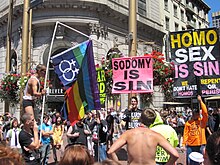
Back المثلية الجنسية في الأديان Arabic المثليه الجنسيه فى الاديان ARZ Homosexualidá y relixón AST বিভিন্ন ধর্মে সমকামিতা Bengali/Bangla Homosexualita a náboženství Czech Homosexualität und Religion German Homosexuality and religion English Samseksemo kaj religioj Esperanto Homosexualidad y religión Spanish دین و همجنسگرایی Persian

Homosexuality and bisexuality have been practices for a long time. Different religious groups have had different opinions regarding them. These opinions have changed over time.
There is the view that sexual activity outside marriage is bad. There is also the view that sexual activity that is not about procreation (making babies) is bad. Many Abrahamic religions (Judaism, Christianity, and Islam, mostly) still have this view. For them, homosexuality and bisexuality are unnatural, and wrong. Christianity calls them a sin.[1][2] Many Islamic countries punish such relations. These groups see marriage as the union of a man and a woman.[3] Marriage mostly has the purpose to have children. These people say that because with a same-sex marriage, people cannot have children without help, same sex-marriages are bad, Most forms of Christianity have taken this approach.
In Christianity, these attitudes have slowly changed. In 2020, Pope Francis said that "being homosexual is not a crime".[4] He has also reached out to the LGBTIQ+ people.[5] The pope has said that he thinks that rules about same-sex unions are needed, but that he still opposes same-sex marriage.[6] In Brazil and the Philippines, about 70% of people accept homosexuality as natural. This is a similar rate to that of many European countries.
Judaism generally sees homosexuality as wrong, and contrary to Judaism. Especially Orthodox Judaism has this view. According to Jewish law, being homosexual can be punished with the death penalty. In practice though, Rabbinic Judaism says it no longer has the authority to sentence someone to death. There are also more liberal movements in Judaism. These movements usually see homosexuality the same way as heterosexuality: Being homosexual is no different from being heterosexual.
All of the major Islamic schools disapprove of homosexuality.[7] Islam views same-sex desires as an unnatural temptation, and sexual relations are seen as being against the natural role and aim of sexual activity.[8] Islamic teachings (in the hadith tradition) presume same-sex attraction, extol abstention and (in the Qur'an) condemn consummation.
The discourse on homosexuality in Islam is mostly concerned with activities between men. There are, however, a few hadiths that mention homosexual behavior among women.[source?] Although punishment for lesbianism is rarely mentioned in the histories, al-Tabari records an example of the casual execution in the year 170 AH (786 or 787 AD) of a pair of lesbian slavegirls in the harem of al-Hadi in a collection of highly critical stories about that Caliph's actions as ruler.[9]
Many Islamic countries have implemented the death penalty for homosexual or bisexual relations. Other islamic countries punish such relations with a time in prison, or a fine. In some Islamic countries, there is no punishment for sexual relations between consenting adults but they may face discrimination.[10]
- ↑ "LGBTQ People & Religion". Revel and Riot. Archived from the original on April 28, 2019. Retrieved April 27, 2019.
- ↑ "Faith, Hope and Homosexuality" (PDF). EACU. Archived from the original on October 8, 2011. Retrieved April 27, 2019.
{{cite web}}: CS1 maint: bot: original URL status unknown (link) - ↑ "What does the Bible Say about Homosexuality". The Human Rights Campaign. Retrieved April 27, 2019.
- ↑ "Pope sends letter to Fr. James Martin on homosexuality and sin - Vatican News". www.vaticannews.va. 2023-01-28. Retrieved 2023-03-13.
- ↑ "Pope to LGBT Catholics: 'God is Father who does not disown any of his children' - Vatican News". www.vaticannews.va. 2022-05-09. Retrieved 2023-03-13.
- ↑ "Vatican clarifies pope's remarks on same-sex unions – DW – 11/02/2020". dw.com. Retrieved 2023-03-13.
- ↑ "Al Jumuah, Shaban 1416 AH". The True Religion. Archived from the original on 28 September 2007. Retrieved October 4, 2021.
- ↑ "Homosexuality in the Light of Islam". Madrassah In' Aamiyyah Camperdown. Archived from the original on 6 December 2006. Retrieved October 4, 2021.
- ↑ Bosworth, C.E. (1989). The History of al-Tabari Vol. 30: The 'Abbasid Caliphate in Equilibrium: The Caliphates of Musa al-Hadi and Harun al-Rashid A.D. 785-809/A.H. 169-193. SUNY Press. ISBN 9780887065644.
- ↑ Whitaker, Brian (2016-06-21). "Everything you need to know about being gay in Muslim countries". The Guardian. ISSN 0261-3077. Retrieved 2024-05-15.